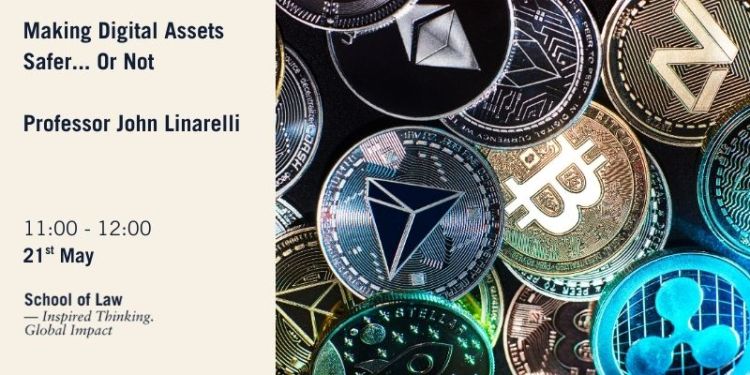Making Digital Assets Safer...Or Not

- Date: Wednesday 21 May 2025, 11:00 – 12:00
- Location: Liberty Building
- Cost: Free
Join CBLP in a guest seminar by John Linarelli (University of Pittsburgh) on the Trump administration's efforts to deregulate crypto and the danger that could cause.
Abstract
In 2008, the University of Pennsylvania Law Review published ‘Making Credit Safer,’ an article by Oren Bar-Gill and then Professor (now Senator) Elizabeth Warren, arguing that credit is a dangerous intangible product in need of regulating just like dangerous physical products such as lawn mowers and infant car seats. The authors recommended the creation of a new Financial Product Safety Commission or a new division within an existing agency to be responsible for regulating consumer credit in the United States. The result was the creation of the Consumer Financial Protection Bureau (CFPB) in the Dodd-Frank Wall Street Reform and Consumer Protection Act in 2010, in the aftermath of the last global financial crisis.
My, how times have changed. The Trump Administration is now in the process of making the next wave of financial capitalism more dangerous. On January 10, 2025, ten days before the US Presidential inauguration, the CFPB issued a proposed interpretive rule to regulate stablecoins, cryptocurrencies, and other forms of electronic payment. The CFPB is in the process of being dismantled. We are now seeing a flurry of activity to deregulate crypto. These efforts include the April 7, 2025 memo by Deputy Attorney General Todd Blanche on ‘Ending Regulation by Prosecution,’ the Executive Order issued by the White House, ‘Strengthening American Leadership in Digital Financial Technology,’ issued on January 23, 2025 (three days after Trump took office), the US Securites and Exchange Commission announcement of a new Crypto Task Force on January 21, 2025, and a wave of SEC retreats on crypto lawsuits and enforcement actions. This all comes at a time when greater clarity on the private law end of digital assets is being implemented in the new US Uniform Commercial Code Article 12.
What is going on? These themes and more will be explored.
About the Speaker
John Linarelli is Vice Dean and Professor of Law at Pitt Law. His scholarship is in commercial, financial, and private law, and he has also written extensively on international trade law. He has been described as one of the world’s most influential comparative commercial law scholars. His work is interdisciplinary, drawing on moral philosophy, philosophy of mind, psychology, and economics.
Professor Linarelli’s work in financial regulation is on the role of debt in society. This work is interdisciplinary and focuses on the use of egalitarian theory, such as luck egalitarianism and contractualist moral theory, to focus on both individual choice in credit transactions and the role of debt in the delivery of social goods such as banking, housing, and education. His recent work includes co-organizing a symposium with Orkun Akseli (Manchester), Iris Chiu (University College London), and Steven Schwarcz (Duke) on Financial Inclusion, Access to Credit, and Sustainable Finance, published in Law and Contemporary Problems in 2021. It also includes publications in the peer-reviewed journals, Regulation and Governance and the Journal of Applied Philosophy.
Professor Linarelli’s current research agenda is artificial intelligence and contract law. This work draws on analytical philosophy and philosophy of mind to study how post-generative AI could affect contract law and contract practices. This work includes publications in the Research Handbook on the Law of Artificial Intelligence, published by Edward Elgar, and the Cambridge Handbook at the Intersection of Commercial Law and Technology, published by Cambridge University Press, and an article in the Uniform Law Review, the official publication of the International Institute for the Unification of Private Law (UNIDROIT). He is frequently invited to speak on contract law, financial regulation, and artificial intelligence.
Extending from this work, Professor Linarelli has developed a philosophical account for contract law based on shared intentionality, uniquely human ability requiring the cognitive capacity to have intentions that may be shared with others. Shared intentionality requires a second personal point of view to accept that one owes an obligation to another.
Professor Linarelli is co-editor, with Teresa Rodríguez de las Heras Ballel, Professor of Commercial Law at Universidad Carlos III de Madrid, of the Hart Studies in Commercial and Financial Law book series. The book series has published a range of important books on diverse topics, from regulation of digital assets to global banking.
Professor Linarelli has led in bringing philosophical theories of global justice in contact with international law. His award-winning book, The Misery of International Law: Confrontations with Injustice in the Global Economy, co-authored with Muthucumaraswamy Sornarajah (National University of Singapore) and Margot Salomon (London School of Economics), published by Oxford University Press, won the European Society of International Law Book Prize in 2019. The book has earned critical acclaim, including from Hilary Charlesworth, a judge at the International Court of Justice. He has edited two books on global justice and international economic law, one published by Cambridge University Press and the other by Edward Elgar.
Professor Linarelli has been invited on numerous occasions to speak and has delivered over 75 talks and papers worldwide. He has served in senior faculty and leadership positions on both sides of the Atlantic. He was formerly a Professor of Commercial Law at Durham University in the United Kingdom, where he was co-director of Durham’s Institute for Commercial and Corporate Law. While at Durham, he was a Visiting Scholar at Columbia Law School. He has served in various capacities for the World Bank, the Asian Development Bank, the Inter-American Development Bank, UNCITRAL, UNIDROIT, and other intergovernmental organizations. Professor Linarelli is an elected member of the American Law Institute and a Fellow of the European Law Institute.

